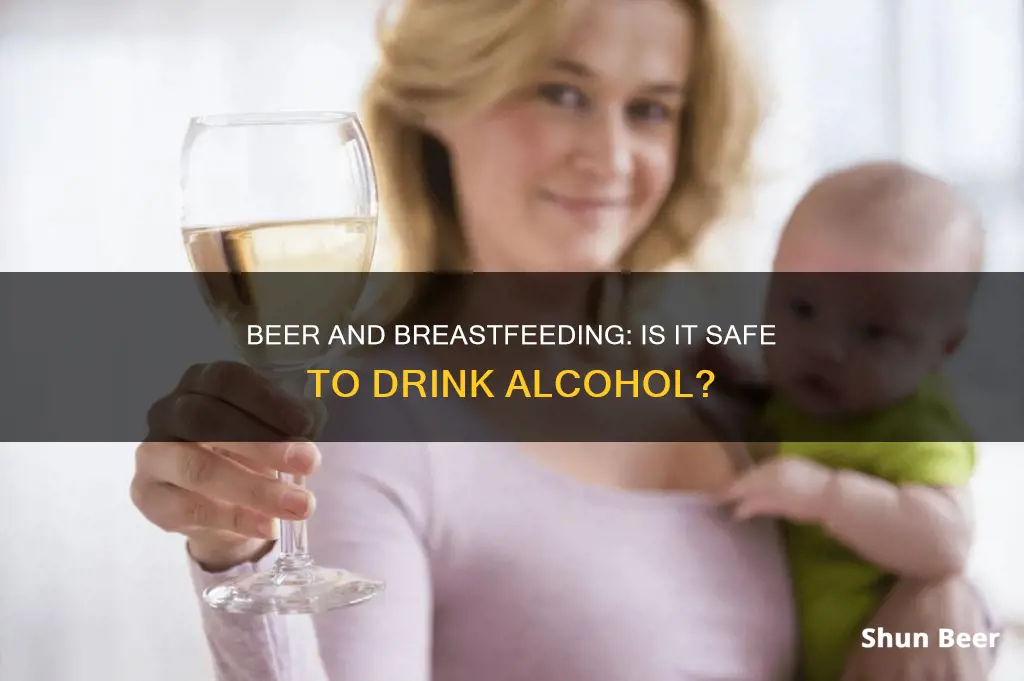
Drinking alcohol while breastfeeding is a topic that has received less research attention compared to alcohol consumption during pregnancy. While it is generally advised to avoid alcohol altogether, it is possible for breastfeeding mothers to consume alcohol in moderation without harming their babies. The key is to understand how to time your drinks and how much you can safely consume. According to experts, it takes around two hours for the average adult to metabolize one drink, and it is recommended to wait at least two hours after drinking one standard drink before breastfeeding again. However, it's important to note that the more you drink, the longer it takes for the alcohol to clear your system. Additionally, drinking alcohol regularly may negatively impact breast milk production and the milk ejection reflex.
| Characteristics | Values |
|---|---|
| Is it safe to drink beer while breastfeeding? | Drinking in moderation (one standard drink) while breastfeeding is likely fine. |
| How long should you wait after drinking before breastfeeding? | It takes around two hours for the average adult to metabolize one drink. It is recommended to wait at least two hours after drinking one standard drink before breastfeeding. |
| Does alcohol affect breast milk production? | Regularly consuming alcohol can negatively affect breast milk supply and the let-down reflex. |
| Does beer increase breast milk supply? | There is no scientific evidence to support this. |
| What are the effects of alcohol on babies? | Excessive alcohol consumption can impact a baby's sleep patterns and growth/development. It may also cause drowsiness, deep sleep, weakness, and abnormal weight gain in the infant. |
What You'll Learn

Drinking one beer while breastfeeding is probably safe
According to the Dietary Guidelines for Americans, it's recommended to limit alcohol consumption to no more than one drink per day. However, it's important to note that one drink doesn't always mean one glass. One standard drink is typically defined as 12 ounces of 5% ABV beer (about one can or bottle), 8 ounces of 7% ABV malt liquor, 5 ounces of 12% ABV wine, or 1.5 ounces of 40% ABV liquor (one shot).
While drinking in moderation is likely fine, there may be potential long-term effects on the baby, especially from greater exposure to alcohol in breast milk. Some studies have shown that children who were exposed to alcohol in breast milk as babies scored lower on reasoning tests at ages 6-7 compared to children who were not exposed. Additionally, excessive alcohol consumption can impact a baby's sleep patterns and growth/development.
If you're drinking, it's important to have a plan for how to feed your baby before the alcohol has cleared your system. You can breastfeed right before having your drink, and then wait for the recommended amount of time before nursing again. If your baby needs to eat before the alcohol has cleared your system, you can use expressed milk or formula. It's also important to note that drinking alcohol can affect your milk supply and the milk ejection reflex, so it's not recommended as a way to boost milk production.
Beer and Shraddha: A Spiritual Conundrum for Devotees
You may want to see also

Alcohol passes into breast milk
The alcohol level in breast milk is usually highest 30 to 60 minutes after consuming an alcoholic beverage. It can be generally detected in breast milk for about 2 to 3 hours per drink after consumption. The more alcohol consumed, the longer it can be detected in breast milk. For example, alcohol from one drink can be detected for about 2 to 3 hours, whereas alcohol from three drinks can be detected for 6 to 8 hours.
The time it takes for alcohol to leave the body varies from person to person, depending on factors such as weight, the amount of alcohol consumed, how fast it is consumed, whether it is consumed with food, and how quickly the body breaks down alcohol.
It is recommended to wait at least 2 hours after consuming one alcoholic drink before breastfeeding. This allows the alcohol levels in the breast milk to decrease. If the mother needs to feed the baby before the 2 hours have passed, she can feed the baby with previously expressed milk from when she was not drinking.
It is important to note that drinking alcohol regularly may decrease breast milk production and affect the baby's sleep patterns. Excessive alcohol consumption while breastfeeding could also negatively impact the infant's development, growth, and sleep patterns. Therefore, it is advised to limit alcohol consumption to moderate levels, with up to one drink per day considered generally safe.
Blood Thinners and Beer: Safe or Not?
You may want to see also

Alcohol can affect a baby's sleep
It is not advisable to drink alcohol while breastfeeding, as it can negatively impact your baby's sleep. Research has shown that even a small to moderate amount of alcohol can disrupt a baby's sleep patterns.
A study by Mennella and Gerrish (1998) found that infants exposed to alcohol in their mothers' milk spent less time in active sleep during the hours immediately following exposure. This decrease in active sleep was observed in all but four of the 23 infants tested. The study also found that the effects of alcohol on sleep were not immediate and were more evident during the second half of the testing session, which took place 1.75-3.5 hours after exposure.
Another study by Mulder and colleagues (1998) found that acute consumption of alcohol by pregnant women had an effect on the fetal behavioural-state organisation, with rapid eye movement sleep reduced and breathing activity suppressed.
It is important to note that the American Academy of Pediatrics recommends avoiding alcohol while breastfeeding, as alcohol does reach the baby through breast milk. While the amount transferred is relatively small, babies have immature livers that cannot process and eliminate alcohol as effectively as adults.
If you are breastfeeding and choose to consume alcohol, it is recommended to wait at least two hours between drinking and nursing or pumping, as that is the amount of time it takes for the alcohol to leave your breast milk. It is also crucial to ensure that you feel "neurologically normal" before nursing, as any remaining alcohol in your system will still be present in your breast milk.
Additionally, regular alcohol consumption can negatively impact your breast milk supply and your let-down reflex, a hormonal reaction that allows your body to eject milk. Therefore, it is advisable to limit your alcohol intake and prioritise your baby's health and well-being.
Beer and Diabetes: What Diabetics Should Know
You may want to see also

Drinking can reduce milk supply
Drinking beer or any other alcoholic drink can reduce milk supply in breastfeeding mothers. Alcohol interferes with the release of oxytocin, which affects the let-down of breast milk. It inhibits both the milk ejection reflex and milk production, especially when consumed in large amounts. Even a moderate amount, such as a single beer or glass of wine, can disrupt the balance of lactation hormones in breastfeeding women.
While the immediate effects of alcohol on milk production and delivery last only as long as the alcohol is in the mother's system, chronic alcohol use has the potential to lower milk supply overall. The more alcohol consumed, the greater the effect; however, one study noted that drinking as little as 0.3 g of alcohol per kg (which is less than the amount considered acceptable by the American Academy of Pediatrics) reduced milk production by about 10%.
Research has shown that infants breastfed by women who had consumed alcohol prior to nursing consumed approximately 20% less milk in the first 4 hours after maternal alcohol consumption than women who did not drink. This reduction in milk intake may be due to a decrease in supply rather than changes in the taste of the milk. When mothers pumped within 2 hours of consuming alcohol, they obtained significantly less milk than normal.
Alcohol also affects the hormones involved in milk production. It significantly reduces oxytocin levels while increasing prolactin levels. Both hormones influence the milk ejection reflex. The lower the level of oxytocin, the longer the delay in the ejection of milk. The combination of alcohol's effect on these two hormones leads to a significant delay in milk ejection, resulting in a decrease in overall milk supply.
Therefore, while drinking a small amount of beer or other alcoholic beverages while breastfeeding may not be harmful to the baby, it can potentially reduce milk supply. It is recommended to limit alcohol consumption and practice moderation to avoid any negative impact on milk supply and the baby's health.
Drinking Beer with Nocor: Is It Safe?
You may want to see also

Drinking guidelines for breastfeeding mothers
Breastfeeding mothers are often given conflicting advice about whether it is safe to consume alcohol. While it is widely recommended to avoid alcohol during pregnancy, there is less research on the effects of consuming alcohol while breastfeeding. However, according to the Centers for Disease Control and Prevention (CDC), the safest option is to refrain from consuming any alcohol while breastfeeding.
If you do choose to drink alcohol while breastfeeding, it is important to drink in moderation and time your drinks appropriately. Here are some guidelines to follow:
- Limit your alcohol intake to one drink per day, or two at most. One drink is typically defined as 12 ounces of 5% ABV beer (about one can or bottle), 5 ounces of 12% ABV wine (one glass), or 1.5 ounces of 40% ABV liquor (one shot).
- Wait at least two hours after drinking one standard drink before breastfeeding your baby. If you have more than one drink, add two hours for each additional drink.
- Avoid drinking alcohol right before breastfeeding. It is best to breastfeed your baby before consuming any alcohol.
- If your baby needs to feed before the alcohol has cleared your system, use previously expressed milk or formula.
- Do not co-sleep with your baby if you have been drinking, as this can increase the risk of SIDS.
- If you feel intoxicated or impaired in any way, do not breastfeed until you are completely sober. Ensure you have a trusted caregiver to take care of your baby if needed.
- Be aware that the more you drink, the longer it takes for the alcohol to clear your system.
- Alcohol can negatively impact your milk supply and the milk ejection reflex. It is a myth that alcohol, especially beer, increases milk supply.
- Pumping and dumping will not remove alcohol from your breast milk or your bloodstream. It is only necessary for comfort if you feel engorged.
- Alcohol levels in breast milk are similar to blood alcohol levels and are usually highest 30 to 60 minutes after drinking.
- If you are concerned about your alcohol consumption or feel that it is interfering with your ability to breastfeed, consult your healthcare provider for advice and support.
Remember, the best option is to avoid alcohol altogether while breastfeeding. However, if you choose to drink, follow the guidelines above to minimize any potential negative effects on your baby.
Street Drinking: Beer and Walking Laws
You may want to see also
Frequently asked questions
Drinking one beer while breastfeeding is likely safe, but it's important to wait for at least two hours after drinking before breastfeeding or pumping. This is because it takes time for the alcohol to leave your breast milk, and drinking alcohol can also reduce your milk supply.
It takes around two hours for the average adult to metabolize one drink. The more you drink, the longer it takes for the alcohol to clear your system. It's recommended to wait until you feel "neurologically normal" before breastfeeding again.
Yes, alcohol does pass into your breast milk, and it can affect your baby's sleep patterns and growth/development. It can also inhibit the milk ejection reflex, leading to a decrease in milk intake by the baby.
Pumping and dumping does not remove alcohol from your breast milk or your bloodstream. It is only effective for relieving discomfort due to engorgement.







